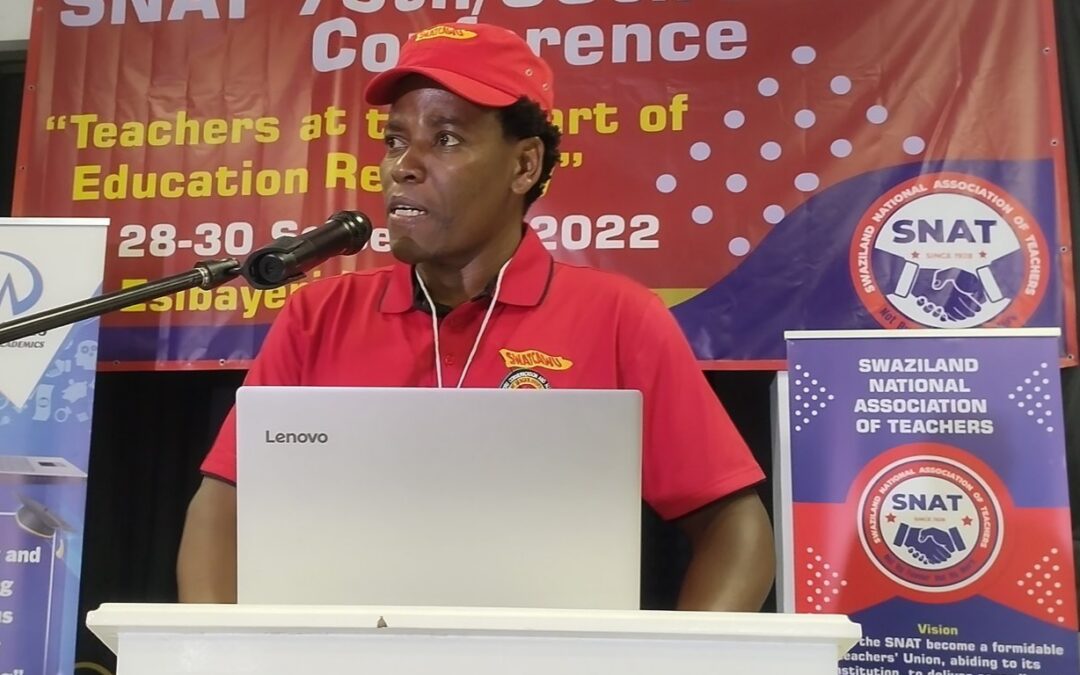Fearing for his life and liberty, pro-democracy activist and Swaziland Transport, Communication and Allied Workers Union (SWATCAWU) General Secretary Sticks Nkambule remains trapped in exile while his union campaigns to bring him home safely.
The murder last month of human and worker rights lawyer and pro-democracy activist Thulani Maseko—whom Nkambule describes as “friend, colleague, personal attorney and man of peace”—demonstrates that Eswatini is unsafe for rights defenders, says Nkambule.
“We are being visited by killing squads,” he says.
While he was out of the country, on December 28, 2022, Nkambule’s home was raided and his family harassed by heavily armed members of the police and military. In January—after police published Nkambule’s name as a wanted person for alleged criminal conduct associated with a SWATCAWU December 13 –14 job “stay away” announcement—Nkambule began receiving reports of dozens of armed state and military members searching for him and other SWATCAWU leaders in multiple locations.
Under such circumstances, Nkambule says his return is impossible and, even in his new location, he cannot live freely for fear of mercenaries.
“The regime is clear to say that certain figures and faces need to go,” says Nkambule, referring to a “list of terrorists” publicly cited by the leader of a South African company that has a contract to train Eswatini security personnel, per news reports.
Eswatini state harassment of unions and other rights defenders is a decades-long pattern which, reports Nkambule, last year included stepped-up police and military harassment of SWATCAWU leadership, and surveillance by unknown persons in unmarked cars. Growing state repression and fear have led many rights defenders to flee, he says—including Swaziland National Association of Teachers (SNAT) President Mbongwa Dlamini, who left the country after state security forces fired live ammunition at his home last year.
Harassment of union leaders ramped up after SWATCAWU began announcing job actions, reports the International Trade Union Confederation (ITUC). The union began a series of “stay aways” last year, says Nkambule, to sidestep the state’s brutal repression of peaceful protests, which in 2021 included police and military members beating rally goers and firing live ammunition into crowds during popular uprisings against the king’s government.
“[The October stay away] worked,” says Nkambule. “When protestors stay in their homes, they don’t get shot.”
However, the threat of a series of transport worker “stay aways”—which brings the economy to a standstill because workers cannot travel to their jobs—presents an unwelcome, and escalating, challenge to the state and employers.
“And that is why I have been singled out,” says Nkambule.
SWATCAWU has been embroiled for almost three years in a lawful and peaceful effort to encourage the state to improve transport workers’ wages and conditions—including a $233 monthly minimum wage, better access to social security and health care, repair of dilapidated roads and an end to police harassment—and to release from prison pro-democracy Eswatini Parliament Members Mduduzi Bacede Mabuza and Mthandeni Dube.
Meanwhile, Africa’s last absolute monarch, King Mswati III, controls all three branches of government, chooses the prime minister, can dissolve Parliament and appoints judges. Under his control, Eswatini has conducted a two-decades-long anti-union and anti-democracy campaign with impunity, reports the ITUC.
Human Rights Watch last month called on the South African government to investigate allegations that South African mercenaries and private military personnel who are allegedly operating in Eswatini are targeting pro-democracy activists. UN and African Union experts condemned Maseko’s murder and demanded an impartial investigation into his death, reiterating UN High Commissioner for Human Rights Volker Türk’s call for the authorities to ensure the safety of all human rights defenders, civil society actors and lawyers in Eswatini.
In the context of shrinking civic space and a global crackdown on human and worker rights, the Solidarity Center continues to support and partner with pro-democracy union activists across the globe, and has long supported beleaguered unions in Eswatini.

